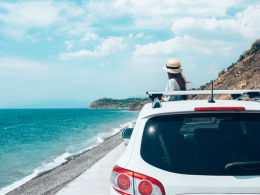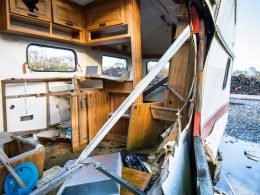Any fire, let alone an RV fire, can be disastrous. So why in the world would someone set their RV on fire?
We really can’t answer that question, but it appears that’s what happened in a Chick-fil-A parking lot. We’ll tell you a little bit about that astonishing situation. We’ll also talk a little bit about RV fires in general and how to prevent them.
Let’s start with the Chick-fil-A fire that never should have happened!

What Is Chick-fil-A?
Chick-fil-A is a fast-food restaurant chain that specializes in chicken sandwiches. The company started in the early 1960s and now has over 2,600 locations across the United States.
It’s known for its friendly service and signature menu items, such as the original Chick-fil-A and spicy chicken sandwich.
Many have also praised the company for its commitment to community involvement and charitable giving. It is also highly regarded for its treatment of employees and a high standard of quality for its food.
HOT TAKE
Have you seen this?! A YouTube Influencer purposefully sets RV on fire.
Where Was an RV Set on Fire in a Chick-fil-A Parking Lot?
The RV was set on fire in a Chick-fil-A parking lot in Spanish Fork, Utah, in October 2022. Spanish Fork is south of Provo. It’s part of the greater Provo-Orem metropolitan area.

Did the Owner of the RV Flee the Scene?
Spanish Fork police said that witnesses saw a person get out of the motorhome and flee the scene on a bicycle. Authorities are still searching for the person, but a Spanish Fork Police Department sergeant said they assumed the person was likely the owner.
Apparently, while responding officers were there, a bystander told them there was ammunition in the RV and not to get close to it. However, before the police could ask could get more information from the bystander, they had already left.
While there, the first responders heard the ammunition exploding, and upon further inspection, found a shell on the ground.
Thankfully, no one was injured.
How Common Are RV Fires?
According to the National Fire Protection Association, there are more than 2,000 RV fires per year. That sounds like a lot, and it is.
But, to put that number into better perspective, there are around 11 million RVs nationwide. That boils down to a minuscule number of RVs that catch fire every year.
How Long Does It Take for an RV to Burn Down?
Though the number of RV fires per year may be relatively small, reports say that an RV can burn to the ground in about 10 minutes. Depending on where the fire started, it may be difficult to get everyone out safely.
And don’t even think about trying to save items inside. Anyone that knows about RV builds or has spent much time in an RV understands why an RV can burn down so quickly.
They largely consist of lighter materials, wood veneers, and plywood. They are often tinderboxes on wheels when an open flame is applied.

What Should You Do If There’s a Fire in Your Trailer?
The first step in any fire is to get everyone to safety. Don’t forget your furbabies! Your life and those of your loved ones are much more important than any RV or anything that could be in it.
If the fire is small and something you can put out without putting yourself or others at risk, put the fire out with a fire extinguisher.
If the fire is too big to extinguish safely, get out. It’s that simple. Do not re-enter the RV once you leave. Fire can spread much faster than you might anticipate.
Call 911 to get help. Remember, wherever you are camping, whether in an RV park or boondocking somewhere, always know your location. It may sound silly, but if there’s an emergency, it’s much easier for emergency responders to find you if you can tell them where you are.
How Do You Prevent Fires in an RV?
Most RV fires start as some sort of electrical fire. That could be anything from an electrical short to faulty wiring. Leaving a stove or other open flame unattended while it is on is another leading cause of RV fires.
The best ways to prevent fires in an RV are to avoid situations that can start them. A great place to start is to have a regular maintenance plan and stick to it. Certain elements of the RV, particularly the electrical and propane systems, should be regularly checked.
Maintenance can be as simple as checking flues and exhaust ports for animal nests that may cause blockages. But it also means having a professional inspect your electrical and propane systems regularly.

Make sure that you have all the necessary safety devices, such as a smoke alarm, carbon monoxide detector, and LP detector. Also, regularly test the detectors and change batteries as recommended. Be sure to have several fire extinguishers, as well, in easy-to-reach, unlocked places.
Devise a safety plan that includes escape routes, knowing your location, and knowing how to contact emergency services. Ensure that anyone traveling in the RV knows the plan, particularly how to escape the RV via emergency exits.
Connecting to shore power seems like a safe enough situation. You should, however, travel with an RV surge protection device that gives you feedback on the shore power outlet you intend to plug your RV into. These devices can alert you to any dangerous situations about the outlet’s wiring.
How Many RV Fires Occur Annually in the US?
The National Fire Protection estimates that about 2,000 RV fires occur annually in the United States. That annual number of fires is responsible for about 20 deaths per year.
That doesn’t sound like a lot considering there are millions of RVs in the United States. But what if one of those 2,000 fires involves your RV? Or what if one of those 20 deaths per year is you or someone you love?
At that point, it really doesn’t matter how big or small the numbers are. So please, put the information we’ve provided to good use. It’s much easier to do regular maintenance, put safety devices in place, and develop a safety plan than to deal with the aftermath of a disastrous fire.
It also helps to not set your RV on fire like that person in the Chick-fil-A parking lot.
If You Want the Latest Travel News, Join Our Mailing List
Don’t rely on biased RV industry news sources to keep you informed. Stick with Nomadic News. We publish articles and breaking stories that matter to you every weekday.










